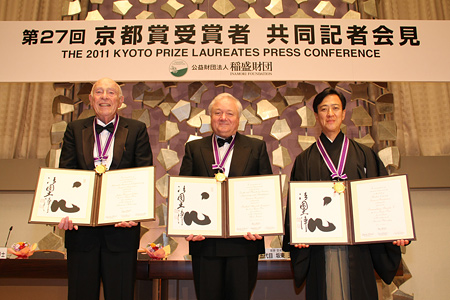Director of the Max-Planck-Institute in Munich receives 2011 Kyoto Prize
Kyoto Prize honours outstanding achievements in science and culture
10 November 2011
Kyoto/Neuss – Astrophysicist Dr. Rashid Alievich Sunyaev, scientist Dr. John Werner Cahn and Kabuki actor Tamasaburo Bando V today received the Kyoto Prize. Together with the Nobel Prize, the award is one of the world's highest honours in science and culture. Every year the Inamori Foundation, established by Kyocera founder Dr. Kazuo Inamori, honours laureates in three categories for their lifetime achievements. The honour comes with 50 million Yen (approximately €470,000*) in prize money for each category.
In a festive ceremony held today at the Kyoto International Conference Center in the old Japanese imperial capital, the three laureates in the categories of “Advanced Technology,” “Basic Sciences,” and “Arts and Philosophy” received a diploma, the Kyoto Prize medal and prize money. The presentation ceremony took place in the presence of members of the imperial family and over a thousand guests from business, political and cultural circles from around the world.
2011 laureates
The German-Russian astrophysicist and director of the Max-Planck-Institute for Astrophysics, Dr. Rashid Alievich Sunyaev, was honoured in the category of Basic Sciences. The Foundation honoured Sunyaev for his significant contributions to observational cosmology and high energy astronomy, in particular for his theory of fluctuations in cosmic microwave background radiation.
The laureate in the category of Advanced Technology is the scientist Dr. John Werner Cahn. The Inamori Foundation awarded the 83-year-old Cologne-born U.S. citizen for his outstanding contributions to research in the fields of material science and material industrial applications — not least in the field of alloy material technology, for developing the theory of spinodal decomposition.
Tamasaburo Bando V, from Japan, received the Kyoto Prize in the Arts and Philosophy category for his life's work as a Kabuki actor. Kabuki is a classical Japanese theatre art that combines dance, pantomime and singing. Tamasaburo Bando V was honoured by the Inamori Foundation for his outstanding representation of female Kabuki roles and for connecting various Kabuki genres in his performances, as well as for his achievements in the field of international performing arts.
Kyoto Prize: an award with tradition
With its Kyoto Prize, the Inamori Foundation honours the outstanding lifetime achievements of individuals and groups who have excelled in the further development of the sciences and arts. The prize was initiated in 1984 by Kazuo Inamori, founder of the Japanese technology company Kyocera, which is headquartered in Kyoto. Kyoto Prize awards are presented annually in November by the Inamori Foundation, also established by Kazuo Inamori, in three categories:, "Advanced Technology," "Basic Sciences" and "Arts and Philosophy."
Among the many distinguished laureates over the past 27 years are the late German choreographer Pina Bausch, German philosopher Jürgen Habermas, Japanese fashion designer Issey Miyake, French composer Pierre Boulez and English primatologist Jane Goodall.
For additional information on the Kyoto Prize and the Inamori Foundation, please visit www.inamori-f.or.jp
• * At October 2011 exchange rate.
Photos: © Inamori Foundation 2011
Copies: Free of charge; please provide specimen copies to Kyocera Fineceramics GmbH Further photo material available upon request
Press Material
- Press Release (pdf) (122.94 KB)
- Press Photo (jpg) (1,002.95 KB)


